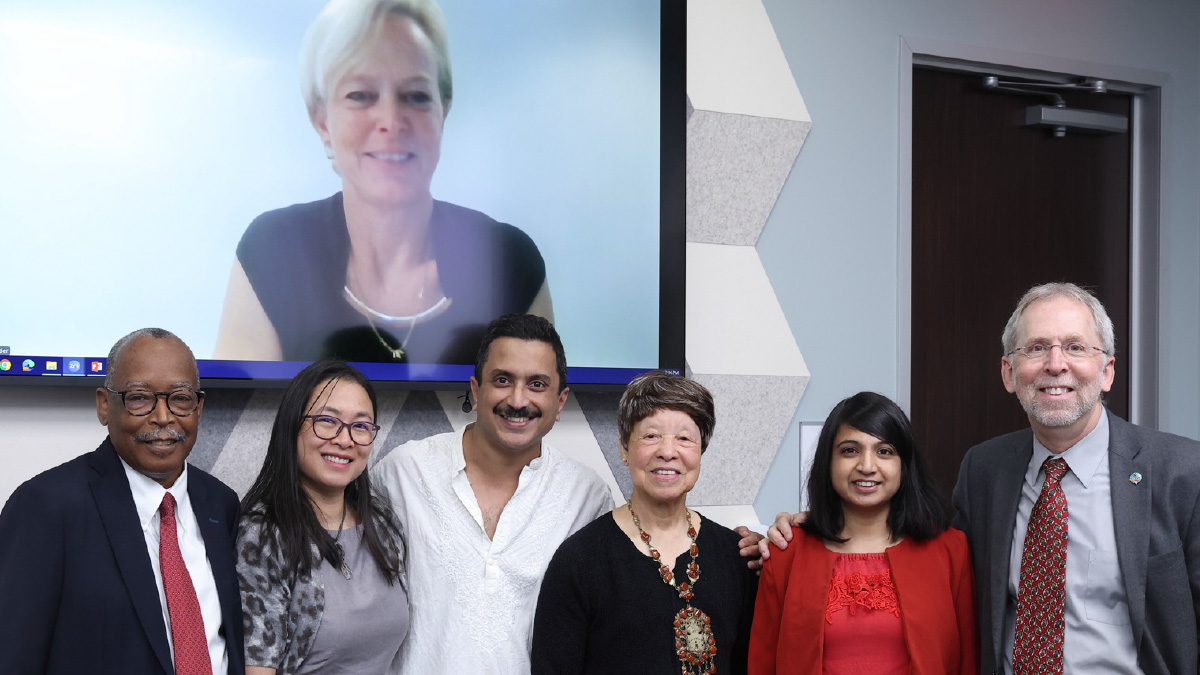NHGRI awards second annual Bettie J. Graham Leadership Awards for excellence in DEIA

A fundamental part of NHGRI’s mission is developing and supporting a diverse genomics workforce, which includes recognizing the exemplary efforts of people who champion diversity, equity, inclusion, and accessibility (DEIA) in genomics. To celebrate such efforts, NHGRI created the Bettie J. Graham Leadership Award for Enhancing DEIA in the Genomics Workforce.
The award, which was first given last year, was renamed at the end of 2023 in honor of retired director of NHGRI’s Division of Extramural Operations, Bettie Graham, Ph.D., who was a strong advocate for DEIA throughout her career. Dr. Graham was also one of the inaugural recipients of the award, along with Pardis Sabeti, M.D., Ph.D., and Ann Mc Cartney, Ph.D.
The Bettie J. Graham leadership award seeks to celebrate the exceptional efforts of NHGRI grantees and staff members at different career levels. The 2023 award recipients are Shilpa Garg, Ph.D., a senior researcher at the Technical University of Denmark; Nicola Mulder, Ph.D., a professor of computational biology at the University of Cape Town; and Shurjo Sen, Ph.D., a program director in the NHGRI Office of Genomic Data Science.
“My dedication to DEIA in genetics and genomics to help society is a personal mission,” said Dr. Garg. “I believe the potential of genomics can only be realized when it is inclusive, equitable, and accessible to all.”
Dr. Garg’s research has focused on the development of high-quality reference genome sequences, emphasizing the inclusion of historically underrepresented groups and thus enabling a deeper understanding of genetic predispositions across diverse populations. In addition to continuing human genomics studies, some of Dr. Garg’s current research focuses on fungal genomics and sustainability. Additionally, mentorship is a cornerstone of Dr. Garg’s work. She has mentored young scientists from diverse backgrounds, creating courses, workshops, internships, and scholarships for underrepresented groups in genomics and advocating for inclusive research.
Prof. Mulder has also created programs to increase diversity in the genomics workforce by supporting capacity building for genomics research in Africa. “My team and I have developed a genomics and bioinformatics training program to meet the very diverse needs and skills required to implement genomics at scale in Africa,” Prof. Mulder said. “This continent has previously been left behind in the development of genomics, and we have designed novel training approaches to enhance DEIA.”
Prof. Mulder leads the H3ABioNet, a pan-African bioinformatics network, which has trained over 4,500 individuals across Africa in genomics and bioinformatics. Aimed at low- and middle-income countries, the training program has reached underrepresented groups in over 18 countries across Africa. In addition to making the training accessible for non-English speakers, Prof. Mulder’s team designed novel delivery methods of the training materials to increase accessibility for as many participants as possible. This has been especially valuable given the enormous demand in resource-limited settings. Beyond her work with H3ABioNet, Prof. Mulder also focuses on mentoring early-career scientists, especially women in science, and she has been a mentor for two mid-career female scientists.
As an extramural program director at NHGRI, Dr. Sen works to create equitable opportunities for students and early-career researchers from all backgrounds to gain access to education and training in computational genomics and data science. Having spent much of his early career in resource-limited institutions, he believes strongly that creating two-way connections between NHGRI and such institutions is a crucial step in broadening the future genomics workforce.
Dr. Sen manages the Genomic Data Science Community Network, a project that aims to create a dialogue between NHGRI and faculty at small and diverse institutions, as well as the Educational Hub for Computational Genomics and Data Science and its associated Educational Partner Sites. These programs support capacity building at institutions that may not otherwise have the resources to carry out computational genomics research, thus providing new opportunities for students from diverse and historically underrepresented backgrounds.
Apart from Dr. Sen’s work at NHGRI, he also has a leadership role in the NIH Common Fund’s Bridge2AI program, where he is working with a large group of stakeholders and NIH’s AIM-AHEAD program to create training opportunities in biomedical artificial intelligence for researchers, clinicians, and community healthcare workers serving disadvantaged locations throughout the United States.
Legal Disclaimer:
EIN Presswire provides this news content "as is" without warranty of any kind. We do not accept any responsibility or liability for the accuracy, content, images, videos, licenses, completeness, legality, or reliability of the information contained in this article. If you have any complaints or copyright issues related to this article, kindly contact the author above.
